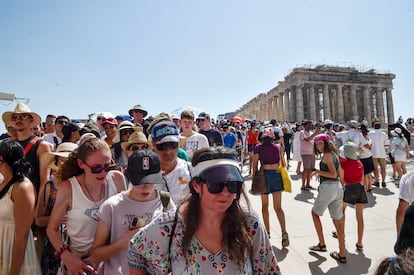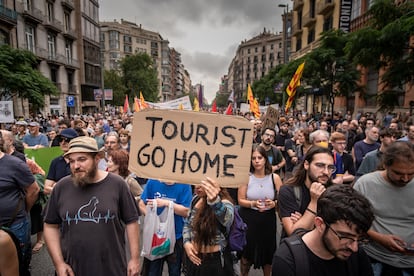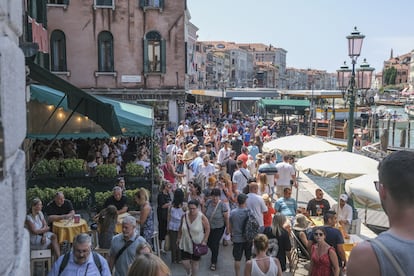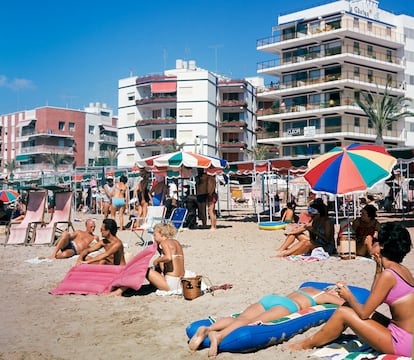What if I’m the bad tourist? How to go on vacation and try not to be part of the problem
Visiting friends, avoiding crowded places, or adapting to the unique characteristics of each city could be part of the solution

In 2019, there was a lot of talk about “flight shame,” a feeling the Swedes call “flygskam,” which refers to the embarrassment that arises when traveling by plane while simultaneously being aware of the carbon dioxide emissions it generates. It was even said that flygskam, which gave rise to an entire social movement (some sports and cultural figures began using trains or sailboats for their commutes), would threaten the airline industry, with passengers increasingly embarrassed to get off their commercial flights. However, data like those from Spain (222 million people passed through its airports in 2018, while 236 million did so in 2023) show that citizens’ ecological awareness is still not as strong as their desire to see the world.
However, although the number of flights continues to grow, things have changed considerably over the last five years, and recently, many other gestures and services associated with vacations have become burdened by potential regrets.
While mass tourism is hardly a novelty (even less so in a Mediterranean country like Spain), until not so long ago this economic activity was concentrated in specialized territories (the city of Benidorm is the paradigm of this model), but today it threatens to devour everything. From city downtowns to the most attractive rural areas, its tentacles also reaching the working-class suburbs. This spread of the effects of tourism both on the map and on people (the Spanish middle classes, impoverished after the 2008 financial crisis, are no longer just consumers of tourism, but also suffer its consequences in their own neighborhoods) has led to a growing perception that, as anthropologist and ecologist Emilio Santiago points out, “our civilization is dying of tourism.”

In 2019, it was hard to imagine protests like those of March 18 throughout the Canary Islands, or those of June 28, 2024, in Málaga, during which environmental issues intertwined with the housing crisis and the exhaustion of young people in the face of an unfair and precarious job market. However, even those young people exploited during the high season want a change of scenery when their holidays arrive and, if they can afford it, relax in a distant place or discover new horizons. In other words, they become tourists.
The options are endless, and from all-inclusive cruises to the most exotic adventures through the Himalayas, the tourism industry offers experiences to appeal to any audience, even those fed up with what tourism causes near their own homes or in their own lives. So, as with the fashion industry or the large technology platforms that manage our data, we must ask ourselves to what extent we want to participate in this business and, of course, if we can afford not to. Because, often, when it comes to dealing with the contradictions of consumer society, giving up or staying on the sidelines is also a privilege.
From blame to the search for alternatives
“One of the most grotesque and laughable privileges that keeps neoliberalism’s motivational structure alive are days away from home. During these days, the technical staff of capitalist society have a fleeting license to indulge in one of their sad, disconsolate sins in the form of parties, drunkenness, or casual sex,” writes Emilio Santiago in his recent essay Psychogeography of There: Poetic Walks Against the Tourist Compulsion.
However, shortly afterward, the environmentalist also asserts that “morally challenging tourism, attempting to combat it by revealing the uncomfortable truth of its social and ecological impacts, is to ensure a place in political failure.”
“It’s hard to escape tourism, although there are some ways out. For example, I like to visit friends. I visit people who’ve lived in their cities for a while, I try to buy local products and not go to franchises but to cafes, escaping the standard and the tourist circuit.”Juan Luis Toboso, comisario y docente experto en arte contemporáneo que reside en Oporto
“Flight shame” may be useful in making the minority population responsible for the majority of flights (in France, 50% of flights serve just 2% of the population) feel guilty and reconsider some of their travel choices, but such approaches aren’t very useful — or fair — for engaging the majority. “Self-restraint has an ascetic quality that doesn’t quite convince me,” says Juan Manuel Zaragoza, professor of philosophy at the University of Murcia and author of Composing a World in Common, a work that delves into the thought of Bruno Latour and the relationship between society and nature.
“The question isn’t so much whether we can travel as whether we can all travel, all the time, everywhere,” the professor continues. “Travel isn’t limited to this era, but what is characteristic of the travel experience right now is mass tourism, which is a different thing that calls into question its sustainability. But it is possible to imagine forms of sustainable tourism: for example, why not travel by sailboat, say, from Ibiza to Sardinia, spending three wonderful days on the high seas?”
Back in 2001, the U.N. developed a Global Code of Ethics for Tourism with 10 points designed to make tourism an activity that is both respectful of the natural environment and beneficial to destination countries. Now that a large part of the local population in those destinations feels that these principles are being trampled on, experts agree that the phenomenon depends more on large corporate and political structures than on the attitude of individual tourists.

For example, it’s not worth asking whether each trip is necessary or contingent; rather, it’s preferable to focus on the conditions of that trip. “I’ve never been a big fan of establishing distinctions between values that are superior or more necessary than others: I prefer to think much more about specific contexts,” Zaragoza clarifies. “These specific elements of tourism concern a way of understanding it that’s closely linked to fossil fuel industries, to traveling by plane or car. It’s the connection between travel and the fossil fuel industry that generates many of the problems we associate with tourism from an environmental perspective.”
So, does it make sense to consider whether we’re acting correctly when planning a vacation? Is there, besides this universal U.N. code, any ethics that can guide us more individually when we become tourists?
“We could think of ethics as a set of norms and values, but what we should be looking for, rather than specific norms, are more general moral principles to guide our actions,” the philosopher responds. “We can start from the fact that we live in what some call the critical zone, which is what Isabelle Stengers calls Gaia, that thin skin of the planet where life is possible,” he continues.
“Our impact or interaction in that part of the planet must contribute to improving its conditions; that is, it must make the part of the world we are in more habitable, not only for humans but also for the other species with which we coexist. We could establish connections that would allow us to understand this; so the first question we would ask ourselves when traveling could be: does my presence in that territory contribute to making it more habitable? Or, on the contrary, does it serve to make the working class more exploited?”
Tourists who suffer from tourism
“Tourism is like an octopus that puts its arms in so many places,” laments Juan Luis Toboso, a curator and teacher specializing in contemporary art who has seen how Porto, the city where he has lived for more than a decade, has transformed in a very short time. “It’s sad to go through a city full of places you don’t identify with and situations you don’t participate in. You end up wondering what you’re doing in a place you feel alienated from,” he explains.
“One of the sensations that most overwhelms me is that, suddenly, this city has different rhythms. There have always been different rhythms for the people who occupy public space: night workers, children going to school, those who get up early to run,” he continues. “But a time has come when all of us who move around the city to produce have found ourselves colonized by people who have a different rhythm. There’s the rhythm of the great mass of tourists [which in turn can be broken down: more senior tourism, that of revelers, that of day trippers...] and, on the other hand, there’s yours, which is very different. When you’re going to take the subway and still have to go shopping, suddenly you can’t walk on the sidewalk because there are 40 people drinking sangria.”
When that’s someone’s daily experience of tourism, it’s worth asking how that citizen plans their own escapes. What does Toboso do when he leaves his “colonized city”?
“It’s difficult to escape tourism, although there are some ways,” he answers. “For example, I like to do tourism by visiting friends. I visit people who have lived in their cities for a long time, I try to buy local products and not go to franchises but to cafes, escaping the standard and the tourist circuit. But of course, that means, in the future, these places can become touristified. One of the causes of the problem is our obsession with posting everything. When I eat well somewhere, I never give the reference to friends of my friends because I don’t want them to go there, take pictures, and then the whole thing starts rolling. I’ll take you to a great restaurant, but I won’t spread the word or let you take a picture,” he warns.

Raquel Agea is a photographer and filmmaker who was born and raised in Benidorm. Agea says that her adolescence in a city so oriented toward tourism has helped her become aware of many problems invisible to visitors, and has caused her to constantly wonder if tourism that is fair to workers and ecosystems is possible.
“As a traveler, I would also love to know the answer to that question. I suppose if people were less selfish and greedy, the overall experience would be different,” she observes.
She hasn’t given up on traveling either, but she tries to do so in the most sustainable way possible: “When I travel, what I seek is to immerse myself in the place, adapt to it, feel like I’m part of it for a while, understand all its nuances, and fully discover its identity. I think that’s already an important part of sustainable awareness when traveling. Normally, tourist places end up adapting to the people who visit them, and the key is just the opposite: as a tourist, as a visitor, approach them with respect, with attention, with affection.”
Of course, Agea is aware that, like many other discourses about slowing things down or sustainability, the idea of “responsible tourism” can also hide a class trap or an elitist notion about something that remains a right. Or, to put it another way, we often do what we do knowing it’s not the best option, but because it’s the only one we can afford: “It can all be summed up in terms of economics, in the class you belong to: if you don’t have the money or the time, you’ll end up opting for the easiest and quickest option. And, for the one time a year you can travel, you feel like your right trumps sustainability.”
Like any other industry, especially when it develops low-cost offerings, tourism generates unavoidable contradictory feelings. There are options to reduce each individual’s impact or to measure their carbon footprint, and it’s finally possible to get involved in some of the platforms that demand political and economic changes toward a fairer production model. But while attempting to change the system, perhaps it’s best to accept these contradictions with good grace. And, as Agea concludes, when we act as tourists, we all become parodies of ourselves: “It’s funny to see people who, as the connotations surrounding tourism become more negative, deny being tourists when they travel because they say they’re escaping tourist traps. Inevitably, they too are part of what they’re denying.”
Sign up for our weekly newsletter to get more English-language news coverage from EL PAÍS USA Edition
Tu suscripción se está usando en otro dispositivo
¿Quieres añadir otro usuario a tu suscripción?
Si continúas leyendo en este dispositivo, no se podrá leer en el otro.
FlechaTu suscripción se está usando en otro dispositivo y solo puedes acceder a EL PAÍS desde un dispositivo a la vez.
Si quieres compartir tu cuenta, cambia tu suscripción a la modalidad Premium, así podrás añadir otro usuario. Cada uno accederá con su propia cuenta de email, lo que os permitirá personalizar vuestra experiencia en EL PAÍS.
¿Tienes una suscripción de empresa? Accede aquí para contratar más cuentas.
En el caso de no saber quién está usando tu cuenta, te recomendamos cambiar tu contraseña aquí.
Si decides continuar compartiendo tu cuenta, este mensaje se mostrará en tu dispositivo y en el de la otra persona que está usando tu cuenta de forma indefinida, afectando a tu experiencia de lectura. Puedes consultar aquí los términos y condiciones de la suscripción digital.









































